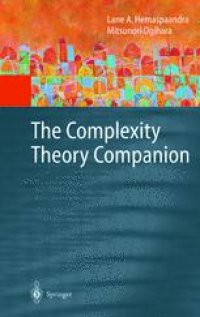
Ebook: The Complexity Theory Companion
- Tags: Algorithm Analysis and Problem Complexity, Combinatorics, Data Structures Cryptology and Information Theory, Math Applications in Computer Science, Discrete Mathematics in Computer Science, Mathematical Logic and Formal Languages
- Series: Texts in Theoretical Computer Science An EATCS Series
- Year: 2002
- Publisher: Springer
- Edition: 1
- Language: English
- pdf
The Complexity Theory Companion is an accessible, algorithmically oriented, research-centered, up-to-date guide to some of the most interesting techniques of complexity theory.
The book's thesis is that simple algorithms are at the heart of complexity theory. From the tree-pruning and interval-pruning algorithms that shape the first chapter to the query simulation procedures that dominate the last chapter, the central proof methods of the book are algorithmic. And to more clearly highlight the role of algorithmic techniques in complexity theory, the book is - unlike other texts on complexity - organized by technique rather than by topic. Each chapter of this book focuses on one technique: what it is, and what results and applications it yields.
This textbook was developed at the University of Rochester in courses given to graduate students and advanced undergraduates. Researchers also will find this book a valuable source of reference due to the comprehensive bibliography of close to five hundred entries, the thirty-five page subject index, and the appendices giving overviews of complexity classes and reductions.
The Complexity Theory Companion is an accessible, algorithmically oriented, research-centered, up-to-date guide to some of the most interesting techniques of complexity theory.
The book's thesis is that simple algorithms are at the heart of complexity theory. From the tree-pruning and interval-pruning algorithms that shape the first chapter to the query simulation procedures that dominate the last chapter, the central proof methods of the book are algorithmic. And to more clearly highlight the role of algorithmic techniques in complexity theory, the book is - unlike other texts on complexity - organized by technique rather than by topic. Each chapter of this book focuses on one technique: what it is, and what results and applications it yields.
This textbook was developed at the University of Rochester in courses given to graduate students and advanced undergraduates. Researchers also will find this book a valuable source of reference due to the comprehensive bibliography of close to five hundred entries, the thirty-five page subject index, and the appendices giving overviews of complexity classes and reductions.
The Complexity Theory Companion is an accessible, algorithmically oriented, research-centered, up-to-date guide to some of the most interesting techniques of complexity theory.
The book's thesis is that simple algorithms are at the heart of complexity theory. From the tree-pruning and interval-pruning algorithms that shape the first chapter to the query simulation procedures that dominate the last chapter, the central proof methods of the book are algorithmic. And to more clearly highlight the role of algorithmic techniques in complexity theory, the book is - unlike other texts on complexity - organized by technique rather than by topic. Each chapter of this book focuses on one technique: what it is, and what results and applications it yields.
This textbook was developed at the University of Rochester in courses given to graduate students and advanced undergraduates. Researchers also will find this book a valuable source of reference due to the comprehensive bibliography of close to five hundred entries, the thirty-five page subject index, and the appendices giving overviews of complexity classes and reductions.
Content:
Front Matter....Pages i-xiii
The Self-Reducibility Technique....Pages 1-29
The One-Way Function Technique....Pages 31-44
The Tournament Divide and Conquer Technique....Pages 45-65
The Isolation Technique....Pages 67-89
The Witness Reduction Technique....Pages 91-108
The Polynomial Interpolation Technique....Pages 109-166
The Nonsolvable Group Technique....Pages 167-195
The Random Restriction Technique....Pages 197-233
The Polynomial Technique....Pages 235-261
A Rogues’ Gallery of Complexity Classes....Pages 263-303
A Rogues’ Gallery of Reductions....Pages 305-308
Back Matter....Pages 309-372
The Complexity Theory Companion is an accessible, algorithmically oriented, research-centered, up-to-date guide to some of the most interesting techniques of complexity theory.
The book's thesis is that simple algorithms are at the heart of complexity theory. From the tree-pruning and interval-pruning algorithms that shape the first chapter to the query simulation procedures that dominate the last chapter, the central proof methods of the book are algorithmic. And to more clearly highlight the role of algorithmic techniques in complexity theory, the book is - unlike other texts on complexity - organized by technique rather than by topic. Each chapter of this book focuses on one technique: what it is, and what results and applications it yields.
This textbook was developed at the University of Rochester in courses given to graduate students and advanced undergraduates. Researchers also will find this book a valuable source of reference due to the comprehensive bibliography of close to five hundred entries, the thirty-five page subject index, and the appendices giving overviews of complexity classes and reductions.
Content:
Front Matter....Pages i-xiii
The Self-Reducibility Technique....Pages 1-29
The One-Way Function Technique....Pages 31-44
The Tournament Divide and Conquer Technique....Pages 45-65
The Isolation Technique....Pages 67-89
The Witness Reduction Technique....Pages 91-108
The Polynomial Interpolation Technique....Pages 109-166
The Nonsolvable Group Technique....Pages 167-195
The Random Restriction Technique....Pages 197-233
The Polynomial Technique....Pages 235-261
A Rogues’ Gallery of Complexity Classes....Pages 263-303
A Rogues’ Gallery of Reductions....Pages 305-308
Back Matter....Pages 309-372
....